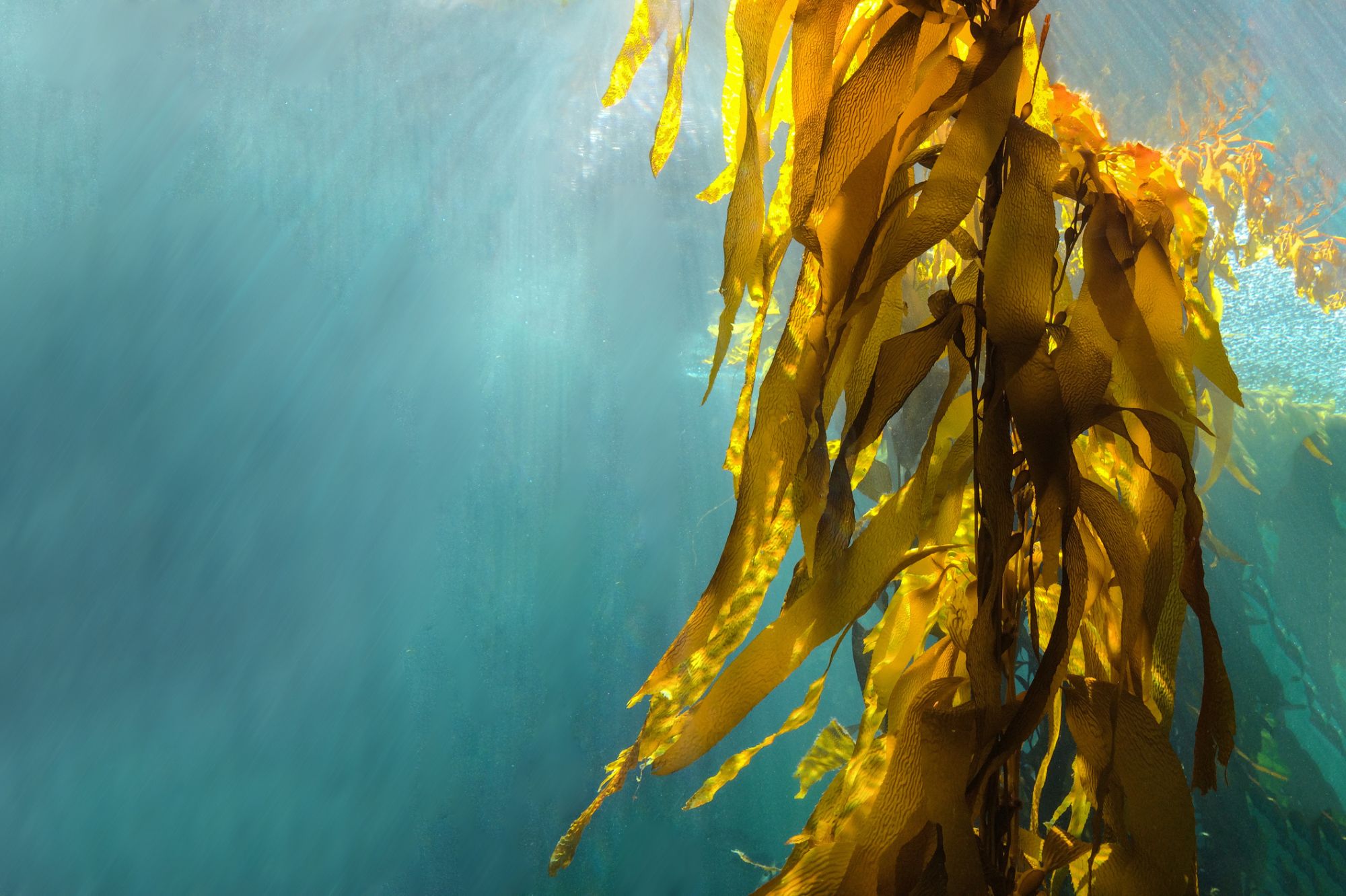Story
PML leads the science on the world’s first co-located seaweed and offshore wind farm
16 February 2023
PML to provide independent analysis of the Amazon-funded North Sea Farm 1 project

Scientists at Plymouth Marine Laboratory (PML) are investigating the potential climate change mitigation benefits of farming seaweed alongside offshore wind arrays.
Seaweed is known to absorb large quantities of CO2 but the extent of its viability for carbon removal at industrial scale is yet to be determined. For “blue carbon’ ecosystems such as mangroves, seagrasses or salt marshes, carbon is sequestered into mud or sediment in the immediate environment – as the plants grow and die, their decomposing matter is absorbed into the ground below. Seaweeds, by contrast, grow in rocky and exposed areas, making the carbon sequestration process much more difficult to track as the seaweed detritus is constantly released into the ocean, sequestering at sites on the seafloor and at unknown locations in the deep ocean.
Watch now: Introduction to North Sea Farm 1
As part of an innovative €1.5 million project, funded through Amazon’s Right Now Climate Fund, a team of scientists from PML is seeking to establish the role offshore seaweed farming could play in capturing and storing carbon in future. Delivered alongside North Sea Farmers (NSF), an international not-for-profit seaweed farming membership organization, North Sea Farm 1 is a first-of-its-kind seaweed farm located amongst offshore wind turbines.
It is hoped the project, and the research it generates, will enable a far greater understanding of the natural processes involved in the seaweed carbon cycle and the ability to track detritus and locate where carbon may be stored for the long term, in the deep ocean and seafloor. Ultimately, North Sea Farm 1 could provide a blueprint for how such farms coupled with seafloor conservation measures could be used for larger-scale capture carbon in future.
Senior Marine and Climate Change Ecologist at PML Dr Ana Queirós is leading the research. She said:
“I’m very excited about this project and the knowledge gap it seeks to address. The carbon dioxide removal potential of the seaweed industry remains unproven and the challenge is to understand how seaweed can be used for carbon sequestration over the long term. There is a lot of interest in the growth of the industry but we need to have the evidence to determine the genuine Blue Carbon value of these habitats. PML is at the forefront of science to understand the seaweed carbon cycle and I’m delighted to be working alongside North Sea Farmers who have one of the most advanced seaweed farming operations in the world.”
Zak Watts, Director EU Sustainability at Amazon said:
“Seaweed could be a key tool in removing carbon dioxide from the atmosphere, yet it’s currently farmed at a relatively small scale in Europe. We’re delighted to fund this project to help us reach a greater understanding of its ability to help fight climate change.”
During its first year of operation, Sea Farm 1 will focus on testing and improving the farm’s production performance. The farm will make the most of the space between wind turbines and if successful it is thought this could be scaled across the North Sea – which has an estimated one million hectares of space available within existing wind farms.
Eef Brouwers, Manager of Farming and Technology at North Sea Farmers said:
“Potentially, up to 85,000 full-time jobs could be created in the European seaweed sector by replicating North Sea Farm 1 across the North Sea, re-purposing the space amongst wind farms. These jobs would not only be in the farming process but also in the production and sales of seaweed-based products.”
Other partners involved in the project include: Deltares and Silvestrum Climate Associates, seaweed product manufacturers Algaia and maritime contractors Van Oord.
About Amazon’s Right Now Climate Fund
In September 2021, Amazon announced it will invest €20 million from its $100m Right Now Climate Fund in projects across Europe that support nature-based projects which provide environmental benefits such as climate change mitigation and biodiversity restoration, as well as social benefits from job creation to access to nature. Read more here.
About the Amazon About North Sea Farmers
North Sea Farmers is an international membership foundation for the seaweed sector, consisting of approximately one hundred diverse members and partners. NSF works on joint investment projects and knowledge exchange on all aspects of sustainable seaweed cultivation. Its activities are focused on but not limited to the North Sea. It is a non-profit organisation.